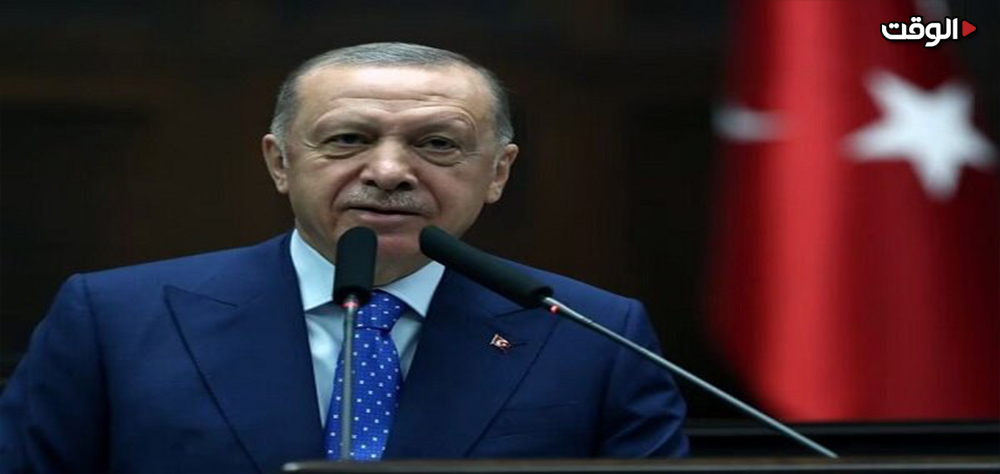Alwaght- Though Turkey last month in a belated move suspended trade ties with the Israeli regime to relieve the enraged public opinion about lack of Ankara support to the Palestinians, the public focus on the intimacy of Azerbaijani President Ilham Aliyev, the close friend of the Turkish President Recep Tayyip Erdogan, with the Israeli government amid Gaza war is causing trouble to Turkey.
The Turkish protestors who in recent months held massive pro-Gaza rallies to condemn the Israeli crimes now have upped the level of their demands, calling for halt of Azerbaijan oil to Israel that crosses Georgia to reach Ceyhan oil terminal for pumping to the occupied Palestinian territories.
Over the past few days, anti-Israeli protestors in Turkey who arranged the "resistance tent" campaign poured red paint on the doors of the headquarters of the State Oil Company of Azerbaijan (SOCAR) and broke its windows in Istanbul in expression of fury with Azerbaijan fueling Israel war machine.
The activism of the pro-Palestinian youths in Turkey has proven to be a growing trouble to Erdogan’s government since the protestors see the Azerbaijani oil exports to Israel as part of the strategic Turkish-Azerbaijan relationship. So far, the government has turned a deaf ear to the demands of protestors and even quelled them. According to Al-Monitor, about 13 protestors were arrested in May 31 by security forces, sending people angry with the ruling Justice and Development Party (AKP).
The continuation of the protests in Turkey comes as Ankara's government officials and Erdogan himself despite taking some ostensible criticism against the Israeli regime for its massacres in Gaza did not take any action to put pressure on this regime until months after the war started. Even critics raise doubts about the veracity of Erdogan's government's claim to suspend trade with Israel, including the claims of some media outlets that reported a number of Turkish commercial ships anchored off the coast of Israel and that trade between the two sides is unaffected.
Since the start of Israeli war on Gaza, Muslim public have been calling for full economic and political boycott of Tel Aviv. Since Israel desperately needs energy, especially oil, to fuel its economy and industry, the oil producers can play a pivotal role in halting Israel's war machine in Gaza. One of these oil producers is Azerbaijan that over the past two decades has built intimate ties with the Israelis and is one of the main oil suppliers of this regime.
According to Energy Press, Israel imports 340,000 barrels of oil per day, of which 60 percent is transported from Kazakhstan and Azerbaijan through the Baku-Tbilisi-Ceyhan pipeline. Israeli oil tankers in Ceyhan port in southern Turkey load Azerbaijani oil daily and transfer it to Haifa port. Israel is considered the top oil export destination of Azerbaijan, and the reason that Ankara continues to mediate this export is not only related to the interests of this country, but also to the interests of Baku.
Though being the largest Shiite country in terms of population, Azerbaijan has never criticized Israel's crimes in the occupied territories and even by granting special privileges to this regime in its own territory, it has become the executor of Tel Aviv's policies in the Caucasus. On the other hand, in recent years, the Israeli regime has been a supplier of key military equipment to Azerbaijan, which includes a wide range of products, from IAI Harop drones, Lora missiles، and even Barak MX air defenses.
Erdogan, a major regional backer of Azerbaijan and who in recent years upgraded relations with Baku to a strategic level, does not want to upset his ally by closing Ceyhan port to Azerbaijani oil.
Erdogan's opportunity to reverse his mistakes
People are totally familiar with Erdogan's exploitative policies regarding Palestine, and this is the reason why public protests continue in the Turkish streets despite the government's pro-Gaza rhetoric.
The popular discontentment with Erdogan’s policies regarding Gaza war reflected itself in the results of municipal elections, where the AKP after two decades lost the race to the rival Islamist parties and the main opposition party, Republican Peoples Party (CHP), for the first time since 2002 beat the AKP. After this loss, Erdogan once again moved to reverse the situation through mobilization of religious layers of the society through taking tough anti-Israeli stances. But ongoing shipment of oil to the Israeli regime have marred Erdogan's credit among the public.
Last week, the Hebrew-language Globes website in a report said that Azerbaijani oil keeps flowing to Israel through Turkey despite Ankara trade boycott of Tel Aviv. The site, citing Israeli officials, reported that Turkey has not yet stopped loading oil tankers from the port of Ceyhan to Israel. This report states that, for example, in January, Israel took the first place in the list of the main oil export destinations of Azerbaijan with 523,500 tons worth about $297 million.
People of Turkey expected their country, like Iran that attacked the Israeli depth in Operation True Promise and won support of the regional public opinion, to do its best in support of Gaza, but it seems that Turkish leaders put economic revenues before support to Palestine.
Given the catastrophic conditions of Gaza as a result of the continued Israeli crimes, Erdogan can reverse part of his wrong policies through halting Azerbaijani oil transfer to Israel in order to win back his past legitimacy at home and popularity in the region. Perhaps such a belated move will stand as a prelude to other countries to join the boycott campaign to put the brakes on the Israeli war machine after 9 months.



























